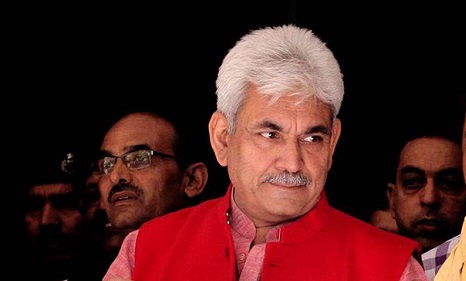Lieutenant Governor Manoj Sinha uses a straight bat and minces no words in articulating his thoughts. This became clear when he talked of the problem of unemployment and how his government plans to tackle it. He said in an interview to a newspaper that this is a big problem everywhere and that this was not something unique to Jammu and Kashmir.
Sinha pointed out that the number of government employees in J&K is equal to, or more than Bihar, a state which has approximately 10 to 11 times more population. He said the UT government is working on a three-pronged approach to generate more employment opportunities. Within the next six months, 13,000 identified government jobs will be provided to the youth. Besides, he said the new industrial policy is likely to lead to heavy investments in the UT and the government is also keen on enhancing skills of the youth.
He envisioned a timeline of almost five years, till 2025, to create more job opportunities for the unemployed in J&K. Once the DDC elections are over, several schemes will be unveiled, among them skill development centres in both the regions.
What he left unsaid is perhaps equally vital as there is wide disparity between unemployment rates in Kashmir and Jammu. At a conservative estimate, the unemployment rate in Jammu is 70% and only 30% in Kashmir. Of the five lakh get employees in the UT, around four lakh are residents of Kashmir, with only a lakh employees drawn from the Jammu region.
In Kashmir, almost 99% residents are Muslims nowadays while as in Jammu, the employees are Hindus, Muslims, Sikhs and some Christians too. It is often alleged by various Jammu-centric political parties that an overwhelming percentage of employees are Kashmiris. In Civil Secretariat, till some years ago, almost 90% of employees were Kashmiris.
A peculiar problem arose some months ago when all the sweepers moved to Kashmir at the time of Durbar Move. That left the secretariat in Jammu without any sweepers as all safai karamcharis employed there hailed from Kashmir. The Estates Director made some ad hoc arrangements for cleaning of the secretariat premises in Jammu clean. It only goes on to show that the lowliest of government jobs had been appropriated by Kashmiris.
In the days to come, the number of jobs going to people from Jammu may show some improvement as powerful Kashmiri politicians get sidelined. A more fair and open selection process may also lead to a better balance between the two regions. This is something that was done rather blatantly in J&K in the past but things may change in the near future.
In the garb of “special status”, discrimination against the Jammu region got institutionalised. This is something that most Kashmiri politicians won’t admit and to deflect closer scrutiny of their records, continue harping on the restoration of this status.
Sant Kumar Sharma, a seasoned journalist, is an authority on Jammu and Kashmir. Two of his books on Article 370 and Delimitation are already out. The third one on Indus Waters Treaty is now out and could be bought here.
Sant began as a teacher but after six years, joined the Indian Express, Chandigarh in 1990, the year when terrorism was taking its first step in J & K and soon there would be exodus of lakhs of Kashmiri Pandits from the Valley. He subsequently worked for The Statesman, The Times of India and Star News among others. He is based in Jammu since May 2000.


